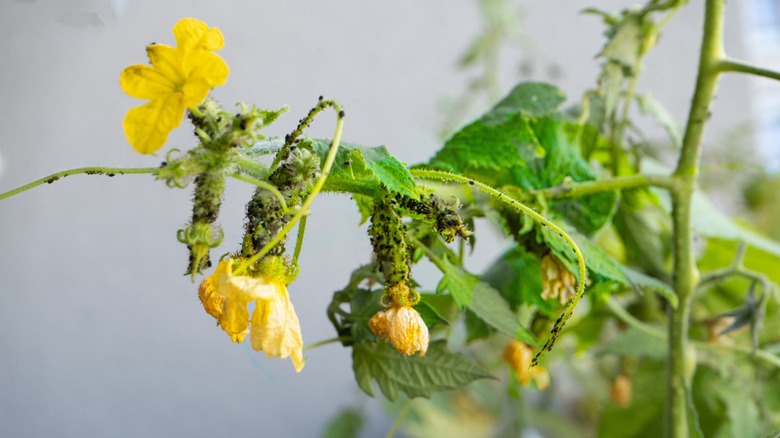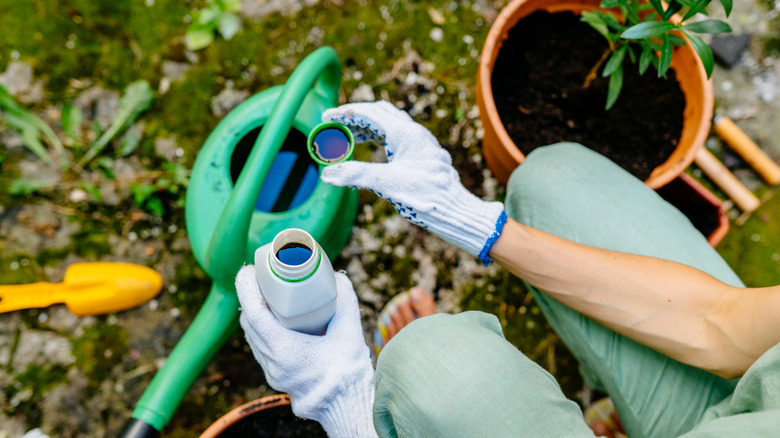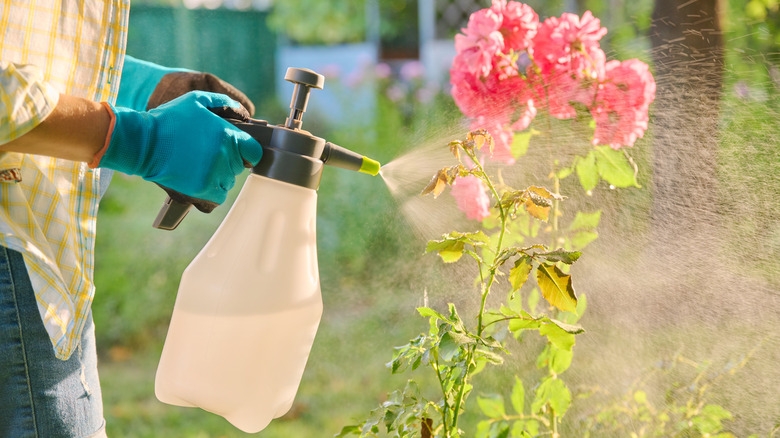The Hydrogen Peroxide Hack Gardeners Use To Combat Aphids (& Should You Try It?)
You've waited months to harvest your Brussels sprouts, and you already have recipes planned in your mind. As you approach the stalks, scissors in hand, you notice the telltale fuzzy gray of an aphid plague all over your coveted crop. You remember reading about a solution made from one part 3% hydrogen peroxide and three parts water that will stop these pests in their tracks. Considering the damage already wrought by the bugs, is this remedy worth a try? Well, it depends.
Organic gardeners are always on the lookout for more possible pesticides that don't put their own — and the planet's — health at risk. There are many brilliant ways hydrogen peroxide can be used in your garden, and as a potent aphid killer appears to be one of them. Researchers have studied and debated using hydrogen peroxide as a pesticide for a while, and there have been very promising findings. What's not certain yet is the proportion of hydrogen peroxide in water that will curtail the bugs without harming the plant. There isn't much science to assure whether the 3:1 water to hydrogen peroxide hack will kill aphids but not plant tissue. However, if you have a plant that's hopelessly invaded with the bugs, it may be worth a try.
What does the research show so far?
There are plenty of hydrogen peroxide pest control hacks both to try and to avoid, so which category does this tip fall into? In short, products including hydrogen peroxide have been shown to kill aphids safely. Hydrogen peroxide isn't considered harmful because it breaks down quickly into water and oxygen, and it's usually diluted in water before use. Since 1998, hydrogen peroxide-based pesticides have tackled bacteria and fungi on plants when sprayed on their leaves and applied to the soil before planting. As they feed, aphids produce a sticky byproduct that can develop into sooty mold. This fungal disease is ugly, but it can also disrupt plants' photosynthesis. Given hydrogen peroxide's proven power at defeating fungi, it may also put an end to this damaging after-effect of aphids.
The trouble lies in taking the numbers shared in scientific data and translating them into something we can use at home. The formulas shared in the reports are difficult for the average gardener to convert into a recipe we can whip up and use with confidence. The makers of Huwa San TR-50, a product that consists mainly of hydrogen peroxide and water, appear to have gotten the proportions of these two key ingredients right. This non-toxic and biodegradable material not only killed aphids in studies, but it also helped heal plant tissue that was damaged by aphids. More importantly, it didn't do any harm to bee populations.
What are the risks of (and alternatives to) hydrogen peroxide?
So, the answer to whether this hack is worth a try depends on whether you have an aphid-ridden plant you're willing to sacrifice in case the 3:1 water to hydrogen peroxide mixture is too strong. Although hydrogen peroxide is safe in general, when it's used in concentrations that are too high, it can burn plants.
To give this solution a try, start by removing leaves that are already very damaged by aphids, as well as ones with heavy infestations. Using 3% hydrogen peroxide, mix one part with three parts water in a spray bottle. Spray the leaves on both sides with the liquid, and if there's evidence of bugs also in the soil, water the plant with the liquid as well. If you're not willing to risk your plant, you can get rid of aphids in plenty of tried-and-true ways, and most of them are safe for both humans, beneficial insects, and the planet. Opt for neem oil, soapy water, or rubbing alcohol with water as proven remedies.


